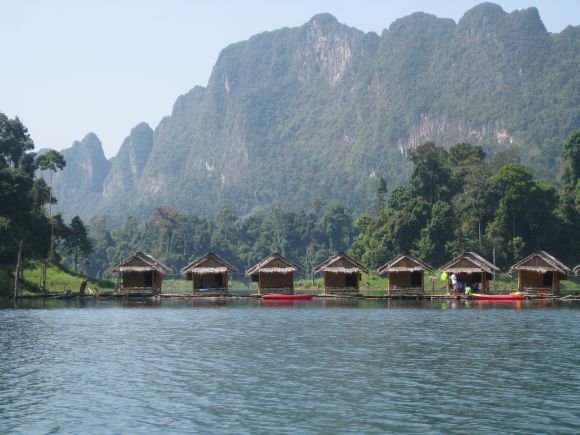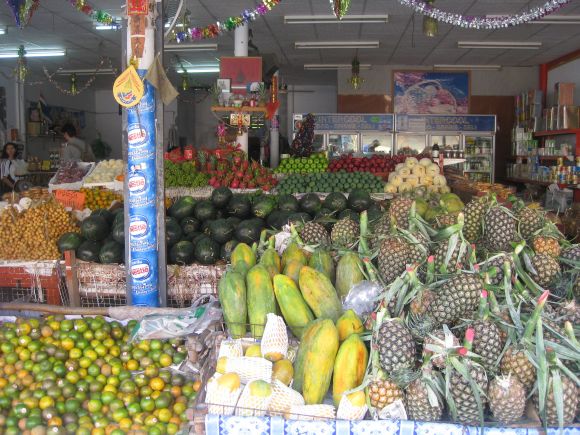The following is a guest post by Ben Manning. If you’d like to guest post on Go Backpacking, please read our submission guidelines.

Raft houses at Ratchaprapa Dam Khao Sok, Thailand
However you look at it, money is the principle enabler of your travel. Even travelling on the tightest of shoestrings requires money (food, shelter and water at the very least; see Maslow's hierarchy of needs) – the absolutely key thing is to manage it proactively and control it…and not bury your head in the sand (as you lay on the beach with another beer).
Some basic practices can save you a lot of money and can even supplement your funds to make your travel go on as long as possible – the principle of preserve and supplement. Here are 7 simple tips to help you raise funds for your round the world travel!
Table of Contents
1. Saving
Before you go, the key aim from the first brain wave to go, is to save your cash. This is key: preserve. Identify where you spend the most money and remove everything you can live without. Do this methodically and comprehensively (i.e. go through every item on your bank statement and determine if you really needed to spend that money). For instance, I was able to remove hundreds per month by removing: gym membership (and running outside instead), taking taxis, eating out, drinking in bars, DVD purchases, closing magazine subscriptions, etc.
Aligned to eliminating spending is the measured cut down of activities you deem impossible to cut out: make an effort to reduce these. For instance, burning less petrol by using the car less, reducing home bills, buying cheaper lunches, drinking less alcohol…
2. Sell your stuff
Force yourself to sort through your belongings and ask yourself the question: will I be disappointed if this item isn’t here when I return in 12 months? It’s surprising: all the things you thought were your essential items really aren’t…and this is an opportunity to finance your trip by selling your excess belongings.
One-off larger items can be sold via Ebay or a local listings website….smaller collections of things can be sold via car boot sales and the like. An added benefit is you won’t need to store all that junk now you’ve cleared it away and raise cash in the process.
3. Interest free credit cards
There are many tempting offers available on new credit cards – depending on how you intend to finance your travel (i.e. with existing debt facilities) taking out a new credit card where 0% interest is on offer can save you significantly.
For instance, I took out a new card with 6 month interest free instead of using an existing facility, which I have subsequently used to purchase the travel tickets and travel insurance – meaning over the 6 months it costs me nothing but saves hundreds.
Note: after 6 months you need to remember to pay off the card to avoid high interest rates.
4. Cashback credit cards
Coupled with interest free offers, gaining cashback on spending you know you have to make (for tickets, travel insurance, travel equipment etc) is a great way to gain cash for things you were definitely going to purchase anyway.
On my travel I generated over £100 ($162) of cashback from purchases that I was making anyway: it wasn’t extra cost to me, just a nice kick-back for the spend I made.

Fruit market in Thong Sala Koh Phangan, Thailand
5. Cashback on online purchases
Cashback from credit cards is good, depending on the amount you spend and any enticing starting offers you get (such as 5% cashback up to £2000/$3,242) but the cashback you can gain from dedicated websites will usually supersede what the credit cards can offer.
(Of course, use both together for optimal benefit: use a cashback credit card to purchase goods via a cashback website and you will gain from both systems as they aren’t connected and so you can’t get penalised: the credit card provider is paying for their cashback while the cashback website is paid for by the actual retailer you purchase from.)
So when you go travelling you know you’ll need a rucksack, insurance, towel, MP3 player etc — buy it online and get it cheaper than the High Street….plus gain significant cashback of hundreds and hundreds….for kit you needed anyway.
6. Website monetization
Running a travel blog is a nice way to keep in touch with folks at home with photos, videos and more. It can also help to raise you significant money if monetised effectively. There are many approaches required to effectively achieve significant earnings….but these are the basics: produce compelling content that many people are interested in, understand the basics of traffic procurement via SEO and social media and understand how to ‘commercialise’ your site.
Harnessing this combination will earn much, much more than you think. Indeed many people are able to finance their travel through this single income stream. There is much written about how to do this, including Dave's Travel Blog Success course.
7. Organisation and preparation
This is one of the easiest to do…and one of the easiest to get wrong. When you go travelling you need to tie off your loose ends, close down subscriptions, time your account terminations to ensure you save the very most and get as much rebate and refund as possible.
For instance, some of things I had to time carefully before my trip were: car insurance, car tax, home insurance, mobile phone contract, gym membership, Spotify, and magazine subscriptions.
Being smart and proactive with your planning really can add up to save you a lot of cash. It also gives you peace of mind that you're organised and prepared (which is worth a lot in itself). Of course, once you're on the road it's a whole new world of money management, but that's for another article!
__________
About the Author: Ben is currently on a round the world trip through Asia and Australasia. Read more travel advice and Ben's travel experiences at roundtheworldtraveler.com.
This post was written by a guest contributor. Please reference the author's byline in the post above for more information. If you would like to guest post on Go Backpacking, please read our submission guidelines. For information on advertising opportunities, go here.
Planning a trip? Go Backpacking recommends:
- G Adventures for small group tours.
- Hostelworld for booking hostels.

Leila
Sunday 8th of September 2013
Hi,
What do you suggest for the phone? Just buying a temp SIM card any country that you go? I was worried for not having one permanent number for bank accounts and so on... Any suggestion is highly appreciated. Thanks, Leila
Dave
Monday 9th of September 2013
I've always used my parent's home phone number (and mailing address) as my official address in my home country (United States). I use that info for any new bank accounts or important stuff like that. But I also know people who get a Skype number that lets them receive all their calls to a local cell phone or number in another country.
I usually get a local SIM card for use with people in that country, and use Skype for international calls.
Cindy
Wednesday 26th of September 2012
An interesting and informative blog post Ben! There are definitely some great tips on how to raise funds for travel. Definitely liked your inclusion of Maslow's hierarchy - I agree that food, shelter and water is absolutely needed when travelling and is definitely NOT free! All these expenses add up and they are still only the bare minimum when travelling.
In particular I liked the tips on savings. Cutting down on things which you inherently don't need but have anyway is a great way of cutting costs and saving money! Also, the idea of getting an interest free card and getting cash backs is a great idea. I've never thought of getting a credit card because I never want to be in debt or have to pay interest. But if there are such credit cards which offer interest free, plus offering cash back on items I am going to purchase anyway then I am going to deeply consider getting a credit card for my next holiday!
johnson
Monday 24th of September 2012
Nice blog. I would to travel, somebody out there to fund me.
Caz
Wednesday 16th of May 2012
What a lovely pic! And great post. Going to sell all my stuff and hopefully get going soon!
Health Funds Australia
Friday 20th of May 2011
Though your cause might be across the ocean from your home, there are always local networks that share similar goals and can be great avenues to access funding.